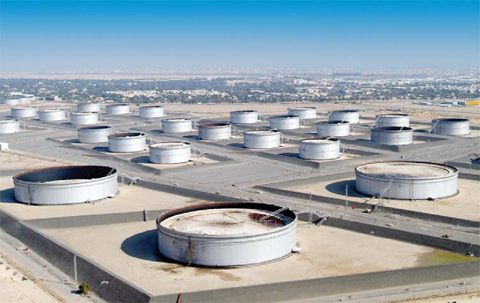KUWAIT: Kuwait will commit to a potential global oil production freeze if major oil producers, including Iran, also agree to join the pact, acting oil minister Anas Al-Saleh said yesterday. OPEC leader Saudi Arabia and non-OPEC producer Russia, the world's two largest oil exporters, said last month they would freeze output at January levels to prop up prices if other nations agreed to join the first global oil pact in 15 years. "If there is an agreement, Kuwait will commit to the freeze," Saleh told reporters.
Asked what would happen if not all the main producers joined in the freeze deal, he said: "I'll go full power if there's no agreement. Every barrel I produce I'll sell." Brent crude futures were trading below $40 per barrel yesterday. The Saudi-Russian accord has so far failed to have a dramatic impact on crude prices, partly because OPEC's third-largest producer Iran plans to raise production after the lifting of international sanctions in January.
Russian Energy Minister Alexander Novak said on Friday that a meeting between OPEC and other leading oil producers to discuss freezing oil output could take place between March 20 and April 1. Novak said the meeting could take place in Russia, Vienna or Doha. Saleh said Kuwait has not received a formal invitation yet but "we will attend" if the meeting of oil producers proved to be "tangible". Kuwait is currently producing 3 million barrels of oil per day, Saleh said. The state has plans to raise its oil production capacity to 4 million bpd by 2020.
Saleh also said the government plans to issue both international and domestic bonds to help cover a budget deficit caused by low oil prices. Saleh told Reuters on the sidelines of a financial conference that the issues would be conducted once government committees had agreed on a plan. He did not give further details. Previously, Saleh had suggested Kuwait might issue bonds in US dollars or in Kuwaiti dinars. It originally aimed to make its first issue by the end of last year, but officials have not yet come up with a final plan.
The ministry projected in January that the government would run a deficit of KD 12.2 billion ($40.7 billion) in the next fiscal year starting on April 1, nearly 50 percent higher than the deficit estimated for the current year, after contributions by the government to the sovereign wealth fund. The government has begun drawing down its huge financial reserves to cover part of the deficit, but it wants to issue debt to limit the speed of the drawdown and also develop Kuwait's financial markets. - Agencies









